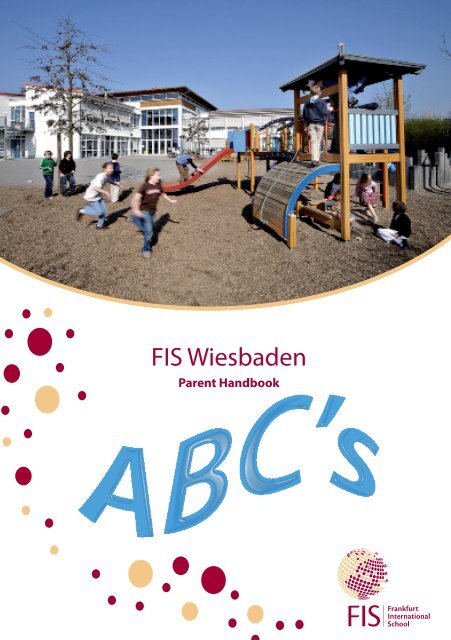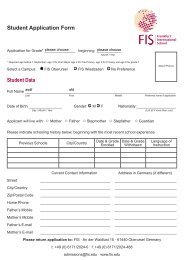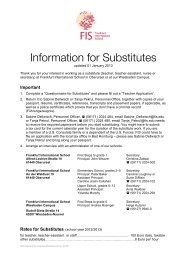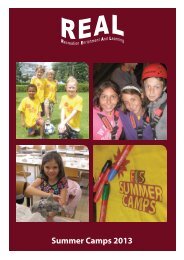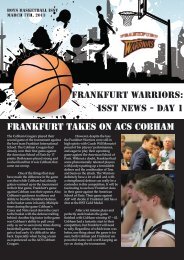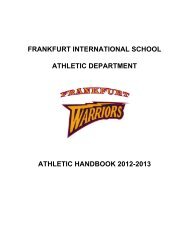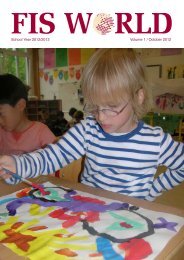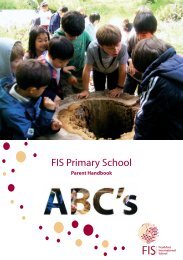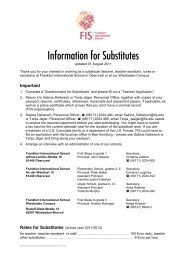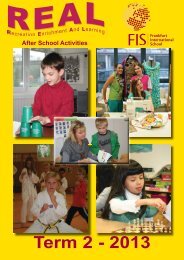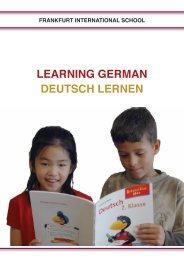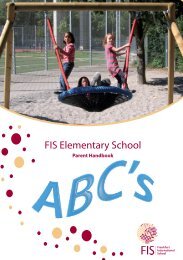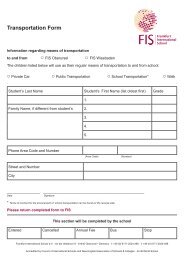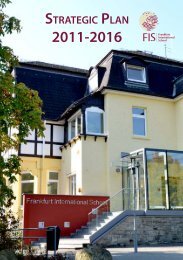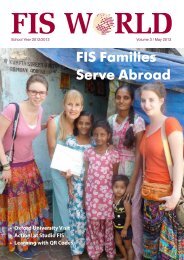Wiesbaden Campus Handbook - Frankfurt International School
Wiesbaden Campus Handbook - Frankfurt International School
Wiesbaden Campus Handbook - Frankfurt International School
Create successful ePaper yourself
Turn your PDF publications into a flip-book with our unique Google optimized e-Paper software.
FIS <strong>Wiesbaden</strong><br />
Parent <strong>Handbook</strong>
WELCOME<br />
Dear Parents,<br />
We are delighted to welcome you to the FIS <strong>Wiesbaden</strong> <strong>Campus</strong>, a place we<br />
are sure that you and your child will find a very special school. This handbook<br />
has been written to help you answer those day to day questions that can make<br />
life so much easier, and is written in ‘ABC’ order for ease of access. Designed to<br />
introduce you to the practices and procedures of our school, please use it as<br />
an initial, quick reference. If you are in need of any further information, we ask<br />
you to contact your child’s home-room teacher or the <strong>Wiesbaden</strong> office as the<br />
first point of contact.<br />
Establishing a strong partnership between our parents, teachers and students<br />
is very important to us all at FIS and we encourage you to walk through our<br />
doors and become part of a community where we are all working together.<br />
Our whole community would want to extend a warm welcome to you, and<br />
we look forward to the many ways we can work together to make your time in<br />
Naurod a successful, challenging and rewarding learning experience for us all,<br />
and most especially for your child.<br />
With warmest wishes,<br />
Andrea Rosinger<br />
Principal<br />
1
A<br />
About Us<br />
<strong>Frankfurt</strong> <strong>International</strong> <strong>School</strong> is an independent, international school<br />
founded in 1961 by a group of six families. The school currently enrolls about<br />
1860 students from First Steps (age 3) through grade 12, and is accredited by<br />
CIS (Council of <strong>International</strong> <strong>School</strong>s) and NEASC (New England Association of<br />
<strong>School</strong>s and Colleges). FIS <strong>Wiesbaden</strong> <strong>Campus</strong> is a division of FIS with a shared<br />
Head of <strong>School</strong> and Board of Trustees. The campus was opened in 1992 and<br />
moved to the current, purpose built premises in September 1998. <strong>Wiesbaden</strong><br />
caters for students from First Steps through grade 5. After grade 5, <strong>Wiesbaden</strong><br />
students transfer to the FIS Upper <strong>School</strong> for grade 6. FIS <strong>Wiesbaden</strong> campus<br />
is an authorized <strong>International</strong> Baccalaureate (IB) World school. Our school<br />
is an international community of learners. Together, our faculty, staff and<br />
families each contribute to a richness of life that enables us all to learn, grow<br />
and live together successfully. Take the time to come in and be part of us-<br />
no contribution is too small, no time with us insignificant and everyone is<br />
appreciated for who they are.<br />
Absent from <strong>School</strong><br />
If your child will be absent from school for any reason, please be sure to call our<br />
administrative office (06127 99400). We will then notify their teacher. (Please<br />
do not call the teacher directly) It will be extremely important for you to report<br />
any contagious diseases to our school nurse, Trish Janoshka (06127 994014).<br />
Your reporting will allow us to notify other parents of potential symptoms and<br />
avoid any wide spread epidemics.<br />
In the event your child becomes sick during the day, we will contact you.<br />
This means that it is critical that we are able to reach you at all times in an<br />
emergency and up to date emergency contact numbers. Please be sure we<br />
have several numbers we can reach your family, and update us when any<br />
changes are made to your contact numbers. Please contact the principal and<br />
your child’s homeroom teacher if you expect your child to be absent from<br />
school for reasons other than illness.<br />
After <strong>School</strong> Activities (REAL)<br />
The Real Enrichment And Learning (REAL) extended day program at FIS<br />
<strong>Wiesbaden</strong> begins in September and finishes in June. There are three terms<br />
for REAL -with different offerings each term. Activities begin straight after<br />
school at 15:10 and usually end at 16:10. You will receive information about<br />
After <strong>School</strong> Activities through the Friday folder and the Parent Portal. You can<br />
also contact the ASA coordinator via e-mail, Brigitte_birnbrier@fis.edu or by<br />
delivering mail to the ASA letter box by the FIS <strong>Wiesbaden</strong> Gym door.<br />
Arrival and Dismissal Procedures and Times<br />
Students should arrive at school between 8:30 and 8:40. Classes begin at 8:45.<br />
Children who arrive early are asked to stay in the Commons until 8:30 when<br />
our supervision begins.<br />
2
Arrival and Dismissal Times<br />
8:30-8:40 Parent and bus drop off time<br />
8:45 <strong>School</strong> begins<br />
15:10 Dismissal for buses/parent pick up - all grades<br />
15:20 Buses depart<br />
Please be sure to communicate with your child’s teacher any changes in dismissal<br />
routines. A written note should be sent with your child to his/her homeroom<br />
teacher and to Frau Kutzner, the <strong>Wiesbaden</strong> administrative assistant, if he/she<br />
is making any change in regular transportation arrangements. Please note<br />
that children can only ride different buses home if there is available space that<br />
day, and if parental permission in writing is provided. In an emergency you<br />
may call us at school (06127 99400) and we will be sure to inform your child’s<br />
teacher. Unless informed in writing or by phone, your child will follow normal<br />
procedures. Please also send a note to your child’s teacher if your child is to be<br />
picked up a person other than a parent.<br />
Arrival and Dismissal by car<br />
Parking in the main entrance area is reserved for teaching faculty and staff.<br />
There is a parent car-park accessible by driving into the school entrance and<br />
turning directly right. You can then walk your children in to school through the<br />
parent car park. In bad weather a drop-off system will be put into operation to<br />
save you having to park your car if you so wish, and your children will be met<br />
in the car park and accompanied into school.<br />
Assemblies<br />
Gathering together as an entire school or as a smaller section of the school<br />
for an assembly on a regular basis is an important tradition at our school. At<br />
assemblies we may sing songs, celebrate learning, honor and participate in<br />
cultural celebrations and simply enjoy being together as a school body. Please<br />
note that assemblies are part of our on-going sharing of learning together<br />
and building community identity, they are not intended to be rehearsed<br />
and practiced ‘performances’. Parents are always welcome to share in our<br />
assemblies if you are in school, but are directed at children and not an adult<br />
audience. We appreciate parent support in keeping our assemblies ‘local’ and<br />
‘low key’. See ‘Open House’ and ‘Performances’ for more public events.<br />
Bags<br />
Each child should bring a school bag or backpack daily that is large enough<br />
to carry a lunch, snack, folders and books. <strong>School</strong> bags are stored in cubbies<br />
outside the classroom.<br />
Beliefs<br />
At <strong>Frankfurt</strong> <strong>International</strong> <strong>School</strong> we believe that:<br />
• Honesty, integrity and respect are essential for building trusting relationships.<br />
• Each person is unique and has equal worth.<br />
3<br />
B
• All people are responsible for their actions.<br />
• Open-mindedness, empathy and compassion are essential for living in a<br />
diverse community.<br />
• Developing head, heart and hand is necessary to realize one’s potential.<br />
• Leading a healthy and active lifestyle improves the quality of life.<br />
• Expectations that are challenging lead to higher levels of performance and<br />
improve results.<br />
• Commitment, enthusiasm and perseverance lead to success.<br />
• Education is a shared responsibility of students, family and school.<br />
• Contributing positively to society and the environment is our shared<br />
responsibility.<br />
• Our lives and the life of the community are enriched by diversity.<br />
• Nurturing curiosity and creativity stimulates exploration and discovery<br />
throughout life.<br />
Behavior (Conduct) Guidelines<br />
The school has four simple conduct guidelines that we ask parents to model<br />
and reinforce with their children at all times they are on school premises:<br />
I will be:<br />
Fair Treat others as I would like to be treated.<br />
Tell the truth and play by the rules.<br />
Do my share to be a responsible student and contribute<br />
positively to the school.<br />
Safe Be careful at work and play.<br />
Make good choices to avoid hurting others or myself.<br />
Seek the help of an adult when needed<br />
Kind Help make the school a friendly place.<br />
Be respectful in my words and actions.<br />
Care for our school and our planet.<br />
Curious Ask questions to help me learn.<br />
Challenge myself with new experiences.<br />
Keep trying even when the task is difficult.<br />
‘Being respectful’ of our school and others, in words and actions, needs<br />
particular attention when children are in school premises out of school hours<br />
and under parent supervision- as children often need reminding that being<br />
quiet and calm in the building is just as important then as when they are here<br />
during school hours. At our <strong>Wiesbaden</strong> campus, students are expected to<br />
know and understand the three self-reflective question prompts , “Is it safe?,<br />
Is it kind? Is it fair?”<br />
Birthday Celebrations<br />
The celebration of a child’s birthday is encouraged and valued. We<br />
acknowledge birthdays in assemblies, in class, and invite you to provide your<br />
4
child’s class mates with a treat (e.g. cupcake, muffin, candy bar) on your child’s<br />
special day. Please be sure to communicate your plans to classroom teachers<br />
a few days in advance and let them know if you will be bringing in treats or<br />
sending them with your child. (Please don’t forget napkins where appropriate)<br />
Celebrations are usually linked to the regular snack or recess times so as not to<br />
interfere with instructional time.<br />
Please keep in mind when sending any treats or snacks to school that many<br />
children suffer from food allergies. In particular, please try to avoid snacks that<br />
contain nuts, and check with your child’s class teacher regarding any particular<br />
concerns for the class.<br />
When planning a party for your child outside of school, we respectfully request<br />
that you distribute the invitations. Please do not ask the teachers or your child<br />
to do this unless the entire class is being invited.<br />
Bus Riders<br />
Please review with your child that once they are on the bus they need to<br />
stay on the bus, put on a seat belt, remain seated, keep their hands and feet<br />
to themselves, and talk quietly with the child seated next to them. Younger<br />
children should be seated near or at the front of the bus. Please encourage<br />
them to do this. We realize many of the younger children cannot see over the<br />
seat in front of them, yet it remains extremely important that they understand<br />
it is for their safety to remain seated. Please contact Annette Schlosser<br />
(Director of Transportation- 06171 2024 466) as your first point of contact for<br />
bus related issues.<br />
Calendar<br />
The annual school calendar is posted on the FIS web site. A paper copy is<br />
available from the FIS <strong>Wiesbaden</strong> administrative office.<br />
<strong>Campus</strong><br />
FIS <strong>Wiesbaden</strong> is a purpose built division of <strong>Frankfurt</strong> <strong>International</strong> <strong>School</strong>,<br />
designed for 3-12 year olds and opened in 1998. In addition to the spacious<br />
and well-equipped classrooms, facilities include specially designed art and<br />
music rooms, a library, an extensive gymnasium, a dance studio, a science<br />
work room and a computer lab. Outside facilities include well-maintained<br />
grounds, a generous play area and a ball play/sports court.<br />
Celebrations<br />
Throughout the school year we participating in many varied cultural and<br />
community celebrations. Our whole school celebrations center around our<br />
host country holidays. Parents, children and teachers are encouraged to share<br />
their own traditions within the classrooms. Your child’s teacher will organize<br />
these in class events with support from room parents. Our German department<br />
takes an active role in preparing students in the school for German holidays<br />
and cultural celebrations.<br />
5<br />
C
Cell phones<br />
Students are discouraged from bringing cell phones to school and may not<br />
use the phones during the school day. Students may use the office telephone<br />
if they need to contact a parent. The school cannot be responsible for the loss<br />
of cell phones.<br />
Class Size<br />
Class sizes in FIS <strong>Wiesbaden</strong> range between 16 and 22 students.<br />
First steps and Pre-Primary classes Max. 16 students /1 teacher/ 1 assistant.<br />
Primary and grade 1 Max. 18 students / 1 teacher/ .5 assistant.<br />
Grades 2 and 3 Max. 22 students /1 teacher /.25 assistant<br />
Grades 4 and 5 Max. 18 students/ 1 teacher/ .2 assistant<br />
At our <strong>Wiesbaden</strong> campus, numbers in grades 4 and 5 are maintained lower to<br />
ensure transition to FIS Oberursel grade 6.<br />
Communication<br />
We are committed to ongoing and open communication with parents. We<br />
ask you to call or contact us by e-mail as any questions or concerns arise. If<br />
you need to meet with a teacher please contact them in advance to schedule<br />
a mutually convenient time. Formal conferences are held twice during the<br />
school year. Conference dates are included on the FIS <strong>Wiesbaden</strong> web page<br />
and in the Upcoming Events section of the principal’s newsletter. You will<br />
receive advanced notice of the time and date for your conferences.<br />
Every Friday, a Friday Folder will be sent home containing notes from school/<br />
classroom or the PTG for your attention. The folder should be returned emptied<br />
the following Monday.<br />
Conferences<br />
Formal conferences are held in November (Goal Setting) and March (Portfolio<br />
conferences), to discuss/celebrate your child’s progress. Students are expected<br />
to be a significant part of conferences. Written reports are sent home in<br />
January and June, or when a child leaves the school. See Reporting.<br />
Curriculum (see also www.fis.edu > Teaching & Learning > Curriculum)<br />
Our curriculum offers a balanced program of academic studies and extracurricular<br />
activities, which aim at helping all students of all nationalities,<br />
develop self-awareness and a love of learning. The philosophy is child<br />
centered and inquiry based, offering a challenging yet supportive learning<br />
environment. Students in First Steps through grade 5 follow the Primary Years<br />
Programme of the <strong>International</strong> Baccalaureate (PYP).<br />
At the heart of the PYP philosophy is a commitment to structured inquiry as an<br />
ideal vehicle for learning. Through the Programme of Inquiry we seek to enable<br />
children to view their world with understanding, sensitivity and fairness. We<br />
want students to understand how human beings build their cultures, how they<br />
value their past, present and future, and how they impact the environment.<br />
6
We also want<br />
children to develop<br />
the ability to solve<br />
problems and recognize the<br />
need, value and appropriateness of<br />
sharing and cooperation as world citizens, valuing our differences and our<br />
similarities as human beings. For more information you can visit www.ibo.org.<br />
Further curriculum information (content specific objectives per grade) can be<br />
obtained from the school web site, (www.fis.edu), or in discussion with the<br />
<strong>Wiesbaden</strong> <strong>Campus</strong> PYP Coordinator, Mr. Jason Bentley.<br />
Transdisciplinary themes of global significance (Units of Inquiry)<br />
Students in grades Primary - 5 explore six units a year within the Programme<br />
of Inquiry. (Students in First Steps and Pre-Primary explore four units). The<br />
program is a matrix of topics organized by themes (see below), which allow for<br />
transdisciplinary exploration, and have been developed by the <strong>International</strong><br />
Baccalaureate as having significance for students across all cultures. A central<br />
idea for each unit addresses cross disciplinary issues but the traditional<br />
disciplines of science, social studies, and the arts are well represented within<br />
the matrix. The transdisciplinary themes allow students to make connections<br />
in their learning from year to year. Careful planning by the grade level and<br />
specialist teachers in collaboration with the Primary Years Programme<br />
Coordinator ensures that topics are taught in an inquiry based way and that<br />
appropriate assessment is developed for each unit. Skills development is a<br />
key feature of the program. We expect children to acquire research, thinking,<br />
social, and communication skills which are developed and consolidated as<br />
students progress through the school.<br />
PYP Transdisciplinary Themes:<br />
Who we are<br />
An inquiry into the nature of the self; beliefs and values; personal, physical,<br />
7
mental, social and spiritual health; human relationships including families,<br />
friends, communities, and cultures; rights and responsibilities; what it means<br />
to be human.<br />
Where we are in place and time<br />
An inquiry into orientation in place and time; personal histories; homes<br />
and journeys; the discoveries, explorations and migrations of humankind;<br />
the relationships between and the interconnectedness of individuals and<br />
civilizations, from local and global perspectives.<br />
How we express ourselves<br />
An inquiry into the ways in which we discover and express ideas, feelings,<br />
nature, culture, beliefs and values; the ways in which we reflect on, extend<br />
and enjoy our creativity; our appreciation of the aesthetic.<br />
How the world works<br />
An inquiry into the natural world and its laws; the interaction between the<br />
natural world (physical and biological) and human societies; how humans<br />
use their understanding of scientific principles; the impact of scientific and<br />
technological advances on society and on the environment.<br />
How we organize ourselves<br />
An inquiry into the interconnectedness of human-made systems and<br />
communities; the structure and function of organizations; societal decisionmaking;<br />
economic activities and their impact on humankind and the<br />
environment.<br />
Sharing the planet<br />
An inquiry into rights and responsibilities in the struggle to share finite<br />
resources with other people and with other living things; communities and<br />
the relationships within and between them; access to equal opportunities;<br />
peace and conflict resolution.<br />
Literacy<br />
The language of instruction is English. Children have daily opportunities to<br />
develop listening, speaking, reading and writing skills. We offer a balanced<br />
literacy program that includes: reading aloud to students often; shared reading<br />
when the teachers and students talk about the literature; guided reading<br />
when teachers teach specific reading skills and strategies and independent<br />
reading when children have opportunities to choose books of their interests.<br />
Independent reading times are an important part of each grade as are home<br />
reading programs. Progress is carefully monitored and is dependent upon<br />
individual strengths and targets.<br />
The development of writing skills, in the balanced literacy program, is<br />
integrated into the transdisciplinary nature of the program. From pre-primary<br />
onwards children are encouraged to write for a variety of purposes on a daily<br />
basis. The writing stages are; interactive writing when children and teachers<br />
work together; shared writing when the teacher models different kinds of<br />
writing; guided writing when the teacher teaches specific skills and strategies<br />
and independent writing. Opportunities are provided for discussing ideas with<br />
8
the teacher and peers, brainstorming, writing, editing and rewriting. Students<br />
learn about publishing and bookmaking and have the opportunity to share<br />
their work. All students are encouraged to write for themselves independently,<br />
learning from an early age that writing serves a communicative and expressive<br />
purpose. Grammar usage, punctuation and spelling are also taught to all ages<br />
as appropriate, frequently using students’ writing as a starting point. Literacy<br />
is taught throughout our curriculum, and in our school, all teachers are<br />
considered teachers of reading and writing.<br />
Numeracy<br />
All children are taught mathematics by their homeroom teachers. The school<br />
expects all students to become fluent users of the language of mathematics<br />
and to be able to recognize, understand and apply the concepts and processes<br />
of mathematics. The PYP aims at building the mathematical confidence<br />
students need so that they may function effectively in our ever-developing<br />
technological era. At all developmental stages of our PYP mathematics we<br />
have performance objectives in the areas of number, measurement, shape and<br />
space, pattern and function and data handling. We stress arithmetic, problem<br />
solving and practical applications. The use of appropriate manipulatives is<br />
an essential aspect of PYP mathematics. Grades First Steps to grade 1 use a<br />
common approach to the teaching of mathematics called Mathematics their<br />
Way. Grade 2 – grade 5 use EnVision Mathematics as a core text.<br />
Teaching Practices<br />
The question of how best will we learn? is addressed by the pedagogy of<br />
guided inquiry. While appreciating that differing techniques can be chosen<br />
by individual teachers, all teachers in our school aspire to promote inquiry<br />
through the following strategies:<br />
• Active, hands-on learning;<br />
• Conceptual learning that leads to understanding along with the acquisition<br />
of facts;<br />
• Meaningful, relevant learning experiences;<br />
• Interaction between students and teachers;<br />
• Cooperative learning<br />
Approaches are varied so that individual students’ needs, abilities, interests<br />
and learning styles are addressed. A variety of instructional materials and<br />
appropriate technology is used. The starting point for inquiry is students’<br />
current understanding. The goal is the active construction of meaning by<br />
building connections between direct experience and content knowledge. Time<br />
to reflect on the learning process is considered an essential part of learning.<br />
Conduct Guidelines<br />
FIS has a defined set of aligned expectations (See Behavior Expectations).<br />
All students are expected to know and understand the three self-reflective<br />
question prompts, “Is it safe?, Is it kind? Is it fair?”<br />
9
D<br />
E<br />
Drinking Water<br />
All children are encouraged to drink water throughout the day. Your child may<br />
be asked to bring a plastic cup or a water bottle labeled with their name. These<br />
will remain at school for daily use.<br />
Early Years Eligibility/Entrance Criteria<br />
For First Steps - grade 1 English will be the principal language of instruction<br />
but is not a requirement.<br />
First Steps: Children who are three on or before 1 September are eligible for<br />
admittance at the start of the school year. Where spaces are available, children<br />
may join a First Steps classroom just after their third birthday, although children<br />
who join in this way will remain in the First Steps program the following year<br />
until they reach the eligibility age for pre-primary. Children must be toilet<br />
trained and have strong foundations in their native language.<br />
Pre-Primary: Children must be four years of age on or before 1 September of<br />
the year they wish to join.<br />
Primary: Children must be five years of age on or before 1 September of<br />
the year they wish to join. Children must have strong foundations in their<br />
native language. Academic assessments are not used to determine eligibility,<br />
however it is important to note that children demonstrating severe learning<br />
or emotional needs may not be accepted or re-enrolled.<br />
Grade 1: Children must be six years of age on or before 1 September of the<br />
year they wish to join. Children must have strong foundations in their native<br />
language. Academic assessments are not used to determine eligibility;<br />
however it is important to note that children demonstrating severe learning<br />
or emotional needs may not be accepted or re-enrolled.<br />
Grades 2 - 5: Children are placed according to age for grades 2 - 5 . Where a<br />
student has successfully completed the age-level grade at a previous school,<br />
school records will be taken into account. The final decision on placement<br />
rests with the Admissions Office in consultation with the Principal.<br />
E-mail/Telephones<br />
Parents and teachers often find it convenient to use e-mail for communication.<br />
Please be aware that teachers check their e-mail each day, but generally not<br />
during the day while teaching. Any important last minute messages should<br />
therefore be relayed through the FIS <strong>Wiesbaden</strong> office (06127 99400). Teachers’<br />
e-mail addresses follow this pattern firstname_lastname@fis.edu. Parents are<br />
discouraged from calling teachers in their classrooms as this disrupts learning<br />
- but can call the school office at any time for a message to be passed on.<br />
English as a Second Language (ESL)<br />
English language learning and development is emphasized throughout the<br />
school day by all teachers. The English as a Second Language (ESL) program<br />
teaches English to non-native speakers from Pre-Primary on. ESL support<br />
is provided by ESL teachers, in both the ESL classrooms and the regular<br />
10
homerooms. Our ESL teachers support classroom teachers and help students<br />
with no or limited English to acquire the language skills of listening, speaking,<br />
reading and writing. Learning a second language generally follows the pattern<br />
of learning a first language: conversational English is most often learned quite<br />
rapidly and enables students to communicate with their peers and become<br />
active participants in the classroom and social environment of the school.<br />
Research shows it may take up to five or seven years for non-native speakers to<br />
develop the academic aspects of the language to the same standard as native<br />
speakers. For this reason we have clear guidelines for children exiting the ESL<br />
program, and many students remain in a ‘monitoring’ program for several<br />
years before they are fully exited. ESL teachers are members of the grade level<br />
teams and participate in team planning to support homeroom teachers in<br />
ensuring that the curriculum is approachable for all language learners.<br />
Emergency Telephone Numbers<br />
In case of accident or emergency of any kind, we need an up-to-date telephone<br />
number that you can be reached at during the day. We also ask that in the<br />
event we may not be able to reach you, you provide us with the name and<br />
telephone number of a neighbor, friend, or colleague who we may contact.<br />
Emergency Calling Tree (PTG)<br />
The homeroom parent for your classroom complies an emergency calling tree<br />
for your classroom. The tree will be used in emergency events such as an early<br />
school closing. Please be sure to keep your room parent updated with any<br />
phone number changes.<br />
Extra Clothing for Early Years<br />
A complete set of extra clothing in a small plastic bag should be kept at school<br />
in case of an emergency for all students in First steps- Primary. Please clearly<br />
mark each item with your child’s name. Any items used will be sent home for<br />
cleaning and we ask that you return them for future use.<br />
Faculty and Staff<br />
Our faculty and staff are made up of 45 dedicated professionals who are<br />
international in perspective and represent 17 different countries. Fluency in<br />
English is a requirement for the faculty and staff working with our students,<br />
but we also speak many other languages.<br />
Field Trips<br />
Periodically throughout the school year children take field trips into our<br />
surrounding community. These trips range from attending a play to various<br />
museums. They are planned to be of educational significance and connected<br />
to our units of inquiry offering valuable learning experiences. Most field<br />
trips require parent chaperones, which offers an additional opportunity for<br />
volunteering. You will also be sent a general field trip permission form that<br />
11<br />
F
G<br />
H<br />
allows the teacher to take the students on supervised trips in the local school<br />
environment on an ad-hoc basis. Transportation costs for field trips are<br />
covered by school, parents are asked to pay entrance costs.<br />
First Language Program (FLP)<br />
Students in grades 2-5 may participate in a First Language Instruction program<br />
in French, Dutch, or German languages during the school day from qualified<br />
teachers. When numbers allow, other languages may also be offered.<br />
German<br />
German is the host country language at FIS. Learning German is therefore of<br />
key importance for both the additional language and the native learners. The<br />
German program is designed to develop the speaking, listening, reading and<br />
writing skills of each student using a variety of strategies that foster the joy<br />
of learning and communication. The goal is to create an environment that<br />
supports the intellectual, physical, social and emotional development of the<br />
child and to provide a challenging intellectual environment for exploring new<br />
languages and cultures. German is taught from pre-primary, and learners are<br />
placed at their proficiency level from Primary.<br />
Pre-primary: 3 periods per week<br />
Primary - grade 3 3 periods a week in proficiency groups, 2 in<br />
‘integrated German’ homerooms<br />
Grade 4 and 5 5 periods a week in proficiency groups.<br />
Proficiency groupings are flexible and students can be moved groups after<br />
careful further assessment during the school year. The German department<br />
integrates language learning with the units of inquiry to provide authentic<br />
learning experiences. Children also learn about German community and<br />
cultural events.<br />
Guests<br />
From time to time we receive a request from one of our students for a child<br />
who is a friend or relative to attend school. When appropriate, students who<br />
have previously attended FIS are allowed to attend one full day of school.<br />
Other guests may attend school for half a day, either until lunch/recess or from<br />
the end of lunch/recess until dismissal. Parents of the FIS <strong>Wiesbaden</strong> student<br />
are required to submit a written request at least three days in advance to the<br />
FIS <strong>Wiesbaden</strong> principal stating the child’s name and class, the name of the<br />
visiting student and their relationship to our student, and the date / time of the<br />
requested visit. The principal will consult the child’s classroom teacher; check<br />
dates, class size and other factors. Parents will be notified of the approval or<br />
otherwise within 48 hours of their request.<br />
Health and Safety<br />
When a child enters school, parents must complete a medical record to provide<br />
the child’s full medical background and immunization record. The school<br />
12
nurse’s offi ce maintains these records. The nurse’s offi ce should be notifi ed of<br />
any changes in the health of a student, such as allergies or any new medical<br />
conditions. All instances of communicable diseases should be reported to the<br />
school nurse. A letter of notifi cation highlighting signs and symptoms of the<br />
disease is subsequently sent to parents. The school has a written health and<br />
safety policy setting out the organization and arrangements for health and<br />
safety in the school. Please contact the nurse if you have any specifi c questions<br />
regarding the policy.<br />
Homework<br />
All FIS <strong>Wiesbaden</strong> students are expected to read at home each day. In grade<br />
2, students begin to complete short assignments, sometimes calling for<br />
the practice of acquired skills. As students mature, homework involving the<br />
extension of class work and the completion of projects becomes a routine<br />
part of academic life.<br />
Homework is usually assigned by the homeroom teacher. Unfi nished class<br />
work, memorization tasks or additional reading may be assigned occasionally<br />
by the German teachers.<br />
General homework time guidelines<br />
Grade 2 - no more than 30 minutes, including 20 minutes of reading<br />
Grade 3 - no more than 40 minutes, including 20 minutes of reading<br />
Grade 4 - no more than 50 minutes, including 20 minutes of reading<br />
Grade 5 - no more than 60 minutes, including 20 minutes of reading<br />
Indoor shoes<br />
All children need a pair of non-marking sport shoes for PE (physical education).<br />
In addition, we ask that all children have a pair of indoor shoes, (slippers/<br />
Hausschuhe - hard soled slip-ons are best), which are especially useful when<br />
the recess area becomes wet or snowy.<br />
Integrated German (Grades 1-3)<br />
In addition to three leveled German language lessons per week, students in<br />
grades 1-3 participate in an ‘Integrated German’ program for two periods,<br />
where aspects of the current unit of inquiry are taught through hands on<br />
learning experiences to the whole class through the medium of German.<br />
Beginning language learners are supported by a bilingual assistant at these<br />
times.<br />
13<br />
I
L<br />
Label All Clothing<br />
Please label all of your child’s belongings!<br />
Learner Profile<br />
The IB (<strong>International</strong> Baccalaureate) Learner Profile has been adopted by FIS as<br />
the defining set of character attributes that we seek to develop in our students<br />
First steps – grade 12. We aim to develop internationally minded people who,<br />
recognizing their common humanity and shared guardianship of the planet,<br />
help to create a better and more peaceful world.<br />
IB learners strive to be:<br />
Inquirers: They develop their natural curiosity. They acquire the skills necessary<br />
to conduct inquiry and research and show independence in learning. They<br />
actively enjoy learning and this love of learning will be sustained throughout<br />
their lives.<br />
Knowledgeable: They explore concepts, ideas and issues that have local and<br />
global significance. In so doing, they acquire in-depth knowledge and develop<br />
understanding across a broad and balanced range of disciplines.<br />
Thinkers: They exercise initiative in applying thinking skills critically and<br />
creatively to recognize and approach complex problems, and make reasoned,<br />
ethical decisions.<br />
Communicators: They understand and express ideas and information<br />
confidently and creatively in more than one language and in a variety of<br />
modes of communication. They work effectively and willingly in collaboration<br />
with others.<br />
Principled; They act with integrity and honesty, with a strong sense of fairness,<br />
justice and respect for the dignity of the individual, groups and communities.<br />
They take responsibility for their own actions and the consequences that<br />
accompany them.<br />
Open-minded: They understand and appreciate their own cultures and<br />
personal histories, and are open to the perspectives, values and traditions<br />
of other individuals and communities. They are accustomed to seeking<br />
and evaluating a range of points of view, and are willing to grow from the<br />
experience.<br />
Caring: They show empathy, compassion and respect towards the needs and<br />
feelings of others. They have a personal commitment to service, and act to<br />
make a positive difference to the lives of others and to the environment.<br />
Risk-takers: They approach unfamiliar situations and uncertainty with courage<br />
and forethought, and have the independence of spirit to explore new roles,<br />
ideas and strategies. They are brave and articulate in defending their beliefs.<br />
Balanced: They understand the importance of intellectual, physical and<br />
emotional balance to achieve personal well-being for themselves and others.<br />
Reflective: They give thoughtful consideration to their own learning and<br />
experience. They are able to assess and understand their strengths and<br />
limitations in order to support their learning and personal development.<br />
14
Learning Support<br />
The Learning Center provides support for children performing below grade<br />
level. Children referred to this program are assessed individually. The Student<br />
Support Team (SST), which includes the learning support teachers, the<br />
counselors and the principal, meets with parents to evaluate all information<br />
and to create an individualized learning plan for the child. The child then<br />
receives academic assistance until able to meet grade level expectations. To<br />
receive learning support beyond grade 5, students must have a professionally<br />
diagnosed learning disability.<br />
Library<br />
Our library is a wonderful relaxing space for students, teachers, and parents to<br />
step into and explore. The collection includes books, periodicals, videos, CDs,<br />
DVDs, and access to online databases. The resources in the library support<br />
the curriculum within the school and play an integral role in the teaching<br />
and learning of the PYP inquiry units. Students borrow books weekly. The<br />
number of books a student borrows is determined by their grade level.<br />
Students check out books during their scheduled weekly library session, but<br />
can also exchange books in their own time. A student with an overdue book<br />
loses borrowing privileges until the book is brought back or paid for. Parents<br />
are welcome to come in at anytime when the library is open to browse the<br />
collection and check out books, CDs, Videos, or DVDs. Our library also has a<br />
band of volunteers who donate their time each week to helping maintain our<br />
library and its resources. Please come and join us!<br />
The library hours are:<br />
Monday – Thursday: 8:30-16:00<br />
Friday: 8:30-15:10<br />
Students must be supervised by an accompanying adult when in the library<br />
after 15:10.<br />
15
N<br />
O<br />
P<br />
Lost and Found<br />
Please label all of your child’s belongings. There is a Lost & Found collection area<br />
located near the elevator. Valuables are usually turned in to the administrative<br />
office.<br />
Lunch<br />
Students either bring a packed lunch from home, or purchase lunches from<br />
school. Menus for the lunch meals are available on the FIS <strong>Wiesbaden</strong> Parent<br />
Portal and are regularly sent home monthly in the Friday folder. You may<br />
also purchase sets of 10 drink tickets for € 5. Tickets are available on Monday<br />
mornings in the commons area.<br />
Nurse<br />
The school nurse is available to deal with minor injuries and to care for sick<br />
children until they can be picked up by parents on a daily basis. The nurse<br />
maintains medical records and dispenses medication needed during the<br />
school day. It is imperative that the school office has a home telephone<br />
number and a contact person (other than a parent) on file, which can be used<br />
in case of emergency.<br />
Open House<br />
At least once a year, parents are invited into their child’s classroom during the<br />
school day to share recent learning and become familiar with regular classroom<br />
activities. Open house is an opportunity for each child to individually celebrate<br />
their recent learning with a parent.<br />
Parent Information Meetings/Talks<br />
Parent forums are offered throughout the school year. The topics include but<br />
are not limited to an overview of the PYP curriculum, specifics regarding math<br />
instruction, literacy instruction, parenting and technology. The forums occur<br />
at set times throughout the school year and last about 1.5 hours. They are<br />
designed to provide an overview of the learning experiences that occur at<br />
school and offer specific advice for supporting children’s learning at home.<br />
The Principal also offers monthly open meetings to talk about forthcoming<br />
events and discuss relevant issues.<br />
Parent Teacher Group (PTG)<br />
The FIS <strong>Wiesbaden</strong> PTG works towards making our school an integrated<br />
community by bringing people together for work and play. We strive to help<br />
create an environment where we all work together as a team to support<br />
our school community and its charities through organizing fund raising,<br />
volunteering, and social events. We invite all parents in our school to come<br />
to our meetings, coffees and events, meet other parents and become a part<br />
of this dynamic group! The PTG also organize annual fund raising events that<br />
fund social events throughout the year.<br />
16
Photographs<br />
In the fall, the school arranges for individual and class photos for students<br />
with a professional photographer. Parents have the option to purchase these<br />
photos.<br />
Physical Education (PE)<br />
All children will need a small gym bag containing shorts, a T-shirt and nonmarking<br />
sport shoes to change into for class. The purpose of our physical<br />
education program is to expose students to a wide variety of physical skills<br />
which allows them to experience success in a many physical activities. Students<br />
will have fun while working to improve their fitness level and recognize the<br />
value of life-long physical activity.<br />
The program is made up of several different units including: body control and<br />
spatial awareness, invasion games, gymnastics, net skills, movement to music,<br />
health-related fitness testing, and adventure challenges. There is a strong<br />
focus on cooperative learning which emphasizes being a contributing, selfmotivated<br />
individual, partner, and group member.<br />
Performances<br />
Drama/Musical Performances: Once a year each grade level develops,<br />
rehearses and then performs a major performance for parents based on<br />
learning that originates from a significant unit of inquiry. For students in First<br />
Steps – grade 4 these take place during the school day. For grade 5 it involves<br />
an evening event.<br />
Musical Concerts: twice a year the school presents a musical evening where<br />
a variety of school groups perform their musical talents. There are also<br />
opportunities for individuals to perform at our ‘all invited’ soloists concerts.<br />
17
Q<br />
R<br />
Playground<br />
We have a wonderful playground and believe that daily physical activity<br />
is important for all learners. Children are encouraged to consider their own<br />
safety, and that of others at all times. Bumps and bruises are all part of exploring<br />
the physical world around us, but your children are always supervised and<br />
expected to play safely and not risk the safety of others. We ask you to take the<br />
same responsibility for your children out of school hours.<br />
Questions<br />
All questions are good questions! We are here as the partners in your child’s<br />
educational journey. We are committed to open two-way communication.<br />
Any time you have a question or concern, please let us know.<br />
Recess<br />
Children will participate in outdoor recess twice daily for between 20-30<br />
minutes. Because fresh air and exercise are so important for children, we will<br />
only stay indoors during severe or extreme weather conditions.<br />
Please dress your children according to the weather. Waterproof shoes and<br />
clothing are essential when we have heavy rain and snow.<br />
Reporting<br />
Reporting to parents takes many forms. Open and ongoing two-way<br />
communication is crucial for developing and sustaining an educational<br />
18
partnership. Written reports on student progress are sent home three times<br />
a year.<br />
• A Settling In report is sent approximately three weeks after school begins to<br />
let you know how your child has settled into the new school year.<br />
• A written progress report is sent home at the end of Semester 1 (End of<br />
January)<br />
• An end of year report is sent home in June.<br />
Throughout the school year, teachers, counselors or administrators will make<br />
additional contact if/when academic, emotional or behavioral concerns<br />
develop.<br />
Security<br />
The gate to the school is code-locked during the school day. Parents can ring<br />
the bell on the intercom for access. Parents need to wear their FIS lanyards to<br />
gain entry. If your child is late, or needs to leave the school early, please come<br />
to the office to report arrival or that you are taking a your child out of school.<br />
Snack<br />
Please provide your child with a small healthy snack and drink each day,<br />
packed in separate containers to lunch. Please note that brain research<br />
recommends a protein snack for mid-morning if your child has an early, or<br />
very small breakfast. We are an ‘allergy aware’ school. Please bear in mind<br />
that some children suffer quite severely from particular food allergies. Please<br />
check with your child’s class teacher regarding any particular concerns for the<br />
class to help us maintain a secure environment for all.<br />
Specialist Classes<br />
We believe that children learn through a variety of experiences and disciplines.<br />
In order to provide a balanced curriculum the following specialist classes form<br />
part of our learning day. (Time varies depending on age group)<br />
German: Three-five specialist lessons per week<br />
Art: One specialist lesson per week<br />
Music: Two specialist lessons per week<br />
PE: Two specialist lessons per week<br />
Library: One specialist lesson per week<br />
Supervision after school<br />
Unless children are attending an after school activity, they must be with a<br />
parent/guardian directly after school, this includes when they are playing<br />
out on the playground. Parents are asked to reinforce school expectations<br />
when children are under their supervision, and remind students that school<br />
expectations apply at all times in the school buildings and grounds.<br />
19<br />
S
T<br />
V<br />
W<br />
Toys/Electronic Gadgets/iPods/MP3 Players<br />
We discourage children from bringing toys or electronic gadgets to school,<br />
however, those with long bus journeys are allowed to use them safely on the<br />
bus, providing they are for personal use only and do not disturb the journey<br />
of others, or distract the driver. The school takes no responsibility for the safe<br />
keeping of electronic items during the school day.<br />
Volunteers<br />
The FIS Mission is to be a family oriented school. A child’s school life is greatly<br />
enriched when the whole family is well informed and active in school affairs.<br />
We welcome parent involvement and encourage close ties between parents<br />
and our school. Early in the school year parents are asked if they are interested<br />
in volunteering at school. There are many ways in which parents can assist<br />
both through the PTG and via teacher established groups and networks - we<br />
would love for you to be involved!<br />
Website<br />
Please visit us at www.fis.edu<br />
We hope this handbook is useful and helpful. We are a mission driven school<br />
that is dedicated to becoming the leading culturally diverse and familyoriented<br />
international school - therefore, any and all suggestions for improving<br />
our communication are welcome. If there is something missing from this<br />
handbook that you would like to see included in a future publication, please<br />
be sure to share that with our principal, Mrs. Rosinger. We are looking forward<br />
to a wonderful school year!<br />
20


